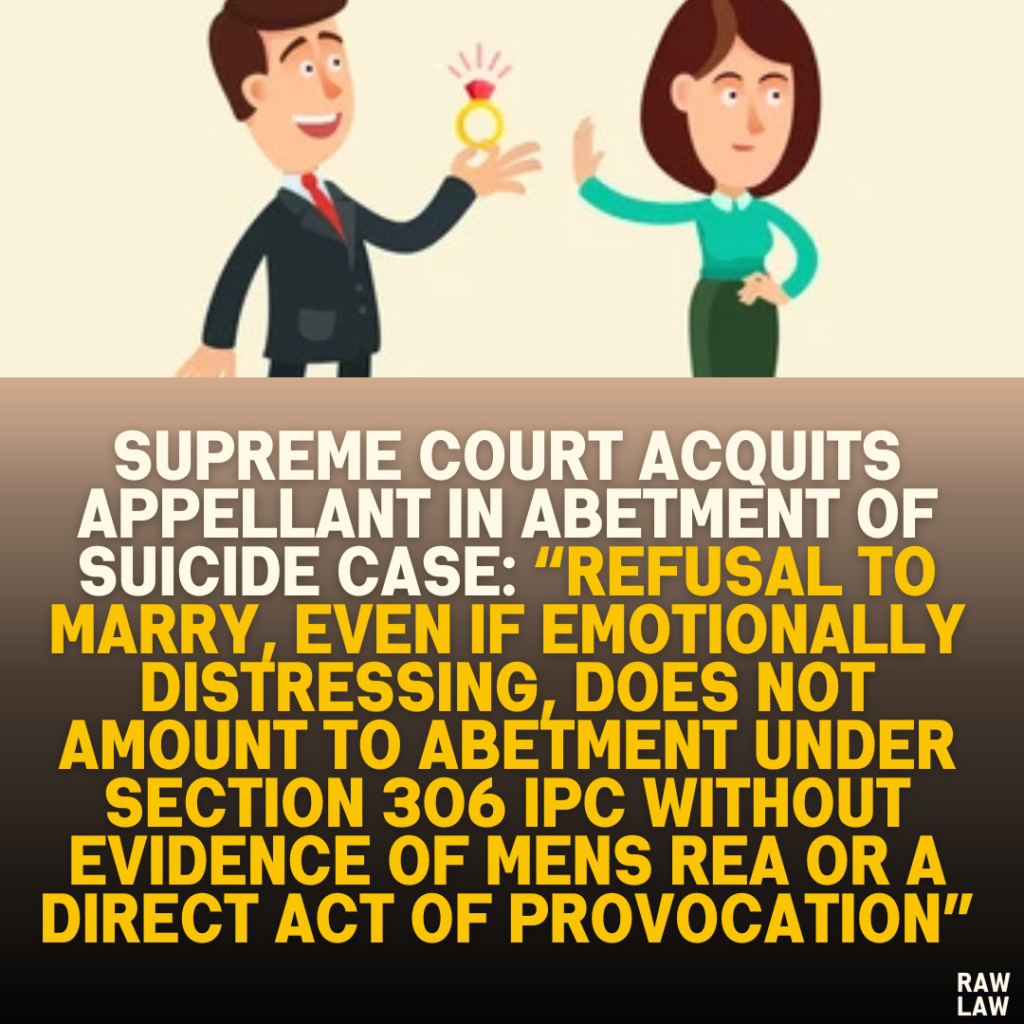1. Court’s Decision:
The Supreme Court acquitted the appellant of charges under Sections 417 (cheating) and 306 (abetment of suicide) of the IPC, restoring the trial court’s verdict. The court emphasized that:
- The evidence did not demonstrate intent or active instigation by the appellant to provoke the deceased to commit suicide.
- Refusal to marry, even if emotionally distressing, does not amount to abetment under Section 306 IPC without evidence of mens rea or a direct act of provocation.
2. Facts of the Case:
- The appellant was charged under Sections 417, 306, and 376 IPC after a woman who claimed to be in love with him committed suicide.
- The prosecution alleged that the appellant had promised to marry the deceased but refused, leading her to consume poison.
- Two dying declarations were recorded. The deceased admitted she consumed poison after the appellant’s refusal but made no allegations of physical relationship or instigation by the appellant.
3. Issues:
The case revolved around two critical issues:
- Did the appellant’s refusal to marry the deceased amount to “cheating” under Section 417 IPC?
- Could the appellant be held guilty of abetment under Section 306 IPC on the grounds of emotional distress caused by his refusal?
4. Petitioner’s Arguments:
The appellant argued:
- There was no evidence that he instigated or provoked the deceased to commit suicide.
- His refusal to marry the deceased was a personal decision and not intended to cause harm.
- The trial court’s findings were based on sound reasoning and evidence, and the High Court erred in reversing the acquittal.
5. Respondent’s Arguments:
The prosecution contended:
- The appellant’s promise of marriage and subsequent refusal amounted to emotional betrayal, leading to the deceased’s suicide.
- By refusing to marry her, the appellant created conditions that drove the deceased to take her own life.
6. Analysis of the Law:
Section 306 IPC – Abetment of Suicide:
- Abetment requires proof of instigation, conspiracy, or intentional aid to the act of suicide. Mere refusal to marry, without evidence of intent to provoke or encourage suicide, does not constitute abetment.
- The court relied on Ramesh Kumar v. State of Chhattisgarh and M. Mohan v. State, which held that emotional distress from broken relationships is insufficient to establish instigation unless accompanied by clear evidence of mens rea.
Section 417 IPC – Cheating:
- Cheating involves intentional deception to cause harm. The court found no evidence to suggest the appellant entered a physical relationship or made false promises with intent to deceive.
7. Precedent Analysis:
- Ramesh Kumar v. State of Chhattisgarh (2001): Emotional utterances or actions without intent to provoke suicide do not fulfill the requirements for abetment.
- M. Mohan v. State (2011): Active instigation or aiding the act of suicide is essential to establish abetment. A mere refusal to continue a relationship does not suffice.
- Amalendu Pal v. State of West Bengal (2010): Mental distress caused by relationship issues, without evidence of direct instigation, does not amount to abetment.
8. Court’s Reasoning:
The Supreme Court made the following observations:
- No Evidence of Instigation:
- The deceased carried poison with her to confront the appellant, indicating a premeditated act unrelated to any provocation by him.
- There was no allegation or evidence in the dying declarations to suggest that the appellant encouraged or incited the deceased’s suicide.
- Mens Rea (Intent):
- The appellant’s refusal to marry the deceased was a personal decision and lacked any intent to harm or instigate her.
- Broken relationships and emotional distress are part of life and do not inherently constitute abetment.
- Dying Declarations:
- The deceased’s statements did not implicate the appellant in any physical relationship or instigatory act.
- The court observed that the dying declarations were consistent in exonerating the appellant from allegations of provocation.
- No Evidence of Cheating:
- The trial court found no evidence that the appellant made false promises of marriage with the intent to deceive or exploit the deceased.
- The court emphasized the absence of corroboration for claims of a physical relationship under the pretense of marriage.
9. Conclusion:
The Supreme Court concluded that:
- The appellant’s actions did not amount to abetment of suicide under Section 306 IPC.
- There was no evidence of cheating under Section 417 IPC.
- The High Court’s judgment convicting the appellant was unsustainable in law, and the trial court’s acquittal was restored.
10. Implications:
The judgment reinforces the principle that:
- Refusal to marry, even if emotionally distressing, does not constitute abetment of suicide without evidence of instigation or intent.
- Courts must differentiate between emotional distress caused by personal decisions and criminal acts involving intent to harm or provoke.
- This case sets a clear precedent for handling similar cases involving accusations of abetment based on emotional or relationship issues.
